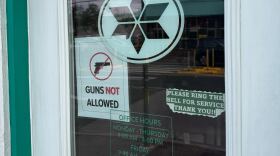The U.S. Supreme Court on Thursday struck down a New York state law that had restricted who could obtain a permit to carry a gun in public.
Under the law in place since 1913, New York residents needed to show proper cause, or an actual need, to carry a concealed handgun in public for self-defense.
The justices said that law conflicts with the Second Amendment's right to bear arms. It drew swift reaction from New York Gov. Kathy Hochul, a Democrat who called the decision reckless and said she was prepared to call the Legislature back into session to form a response.
“We do not need people entering our subways, our restaurants and movie theaters with concealed weapons," she said. "We don’t need more guns on our streets.”
New York and half a dozen other states with similar laws, including Hawaiʻi, now must decide their next steps. All have legislatures controlled by Democrats who could propose measures to ensure that guns will not be allowed in certain places.
Gun rights groups in those states have vowed to continue pushing back against what they view as restrictive gun control laws. Some of those cases eventually could make their way to the nation's high court.
Hawaiʻi has among the strictest gun laws in the nation. So strict, said attorney Alan Beck, that Hawaiʻi essentially bans carrying guns outside the home.
It has been practically impossible to get a permit to carry a loaded gun in public, he said. In the past 22 years, there have been four permits issued in Hawaiʻi, said Beck, who represents various residents challenging Hawaiʻi gun laws.

The state attorney general’s office has argued that it’s not a flat-out ban because people can carry firearms if they have “good cause.”
County police chiefs in Hawaiʻi have had the discretion in determining whether to issue a carry permit, something the Supreme Court now says is too restrictive.
Without a carry permit, people have been allowed to keep firearms in the home and can transport them – unloaded and locked up – to firing ranges and other limited locations such as for repairs.
One of Beck’s clients is George Young, a Big Island resident who wants to carry a gun for self-defense. Young doesn’t care if it’s concealed or open carry. The favorable ruling in the New York case means Young’s lawsuit would prevail, Beck said.
The Hawaii Rifle Association anticipates that lawmakers now will work to make it difficult to obtain permits, “whether it’s outrageous training requirements or exorbitant fees,” said Kainoa Kaku, the association’s president.
“We’re prepared to train potential concealed carry permit holders for whatever ridiculous requirements the state is going to ask of them,” Kaku said.
State Sen. Chris Lee said lawmakers have been getting ready by introducing bills in the last couple of years that would establish training for those who are licensed to carry weapons. He called Thursday's ruling frustrating.
“I think there’s going to be a rush to figure out how states can intervene and ensure public safety,” he said, adding that lawmakers will be looking at screening, training requirements and ways to keep guns out of public spaces.
Chris Marvin, a Hawaiʻi resident with Everytown for Gun Safety, said lawmakers also could consider legislation that carefully vets applicants for a carry permit and rules to keep guns out of locations such as protests, polling places, state land and schools.
Allowing nearly all civilians to carry guns would be a big cultural shift for Hawaiʻi, Marvin said.
“We live in a place that a lot of people call paradise, and they’re usually talking about the weather. But from a safety standpoint and violence standpoint, we live in a place that is a relative paradise to the rest of the country," he said. "We are not perfect and we certainly have our share of violent incidences, but it would be really strange to be walking down Waikiki Beach and see someone with a side arm visibly on their hip.”
The Associated Press writer Jennifer Sinco Kelleher contributed to this story.






